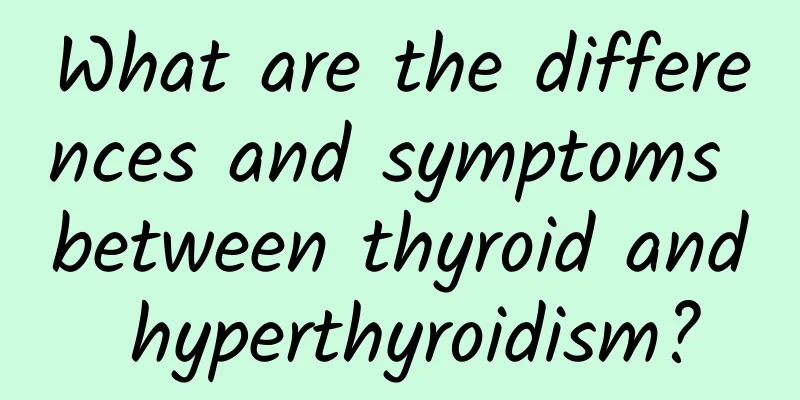What are the differences and symptoms between thyroid and hyperthyroidism?

|
You should know that every part of our body is constantly supplied with energy to maintain various behaviors, thoughts and movements of the body because of the regulatory function of our body's largest endocrine gland - the thyroid gland. So what is the difference between thyroid enlargement and hyperthyroidism? The difference between thyroid enlargement and hyperthyroidism is mainly reflected in the following four points: 1. Different causes, such as pituitary hyperthyroidism, autoimmune thyroiditis, subacute thyroiditis, allogeneic TSH hyperthyroidism, etc., can be identified through corresponding special examinations. Click online consultation to learn more about thyroid diseases 2. Neurological symptoms: The psychoneurological syndrome is similar to that of hyperthyroidism, but without the high metabolic syndrome of hyperthyroidism. The appetite is not increased, and there is a coarse tremor when both hands are raised horizontally. The pulse rate is normal after falling asleep, and there is no thyroid swelling or eye signs. The thyroid function test is normal. 3. Simple thyroid enlargement without symptoms of hyperthyroidism, and all thyroid function tests are within normal range. 4. Different symptoms. For example, weight loss and low fever must be differentiated from symptoms such as nodules; diarrhea must be differentiated from chronic colitis; arrhythmia must be differentiated from rheumatic heart disease, myocarditis and coronary heart disease; unilateral exophthalmos must be differentiated from orbital tumors. Symptoms of hyperthyroidism are: 1. Eat more, lose weight, be afraid of heat and sweat, palpitations, agitation, and thyroid gland enlargement. 2. Easily agitated, mentally hypersensitive, slight tremors when the tongue and hands are held horizontally and extended forward, talkativeness, hyperactivity, insomnia, tension, lack of concentration, anxiety, irritability, suspicion, etc., sometimes hallucinations or silence, depression; 3. Heat intolerance, sweating, fatigue, thyroid swelling, protruding eyeballs (malignant protrusion of the eyeballs: fear of light, tears, diplopia, decreased vision, eye swelling, stinging, foreign body sensation, inability to close the eyes, congestion, edema) Experts kindly remind you: If patients have relevant symptoms, they must go to a regular hospital for treatment as soon as possible to avoid misdiagnosis, delay of the disease, and missing the best time for treatment. |
<<: The difference between hyperthyroidism and hypothyroidism is this
>>: What is the difference between almonds and almonds?
Recommend
Can a man have a vasectomy?
Sterilization is a common long-term contraceptive...
What foods can strengthen the kidneys and boost male potency? Top 3 foods that can boost male potency
If men want to be healthy, they must eat healthy ...
One small action can keep you away from men's diseases
In men's minds, they always think that their ...
How to recover from mild varicocele
Varicose cord is a disease, and many men will suf...
What should men do if they are weak and afraid of cold?
Being afraid of cold and having cold hands and fe...
How to control diet when blood sugar is high? These three points are the most important!
High blood sugar is not diabetes, but diabetes is...
What are the causes of UV allergy?
Allergy is a reaction of the human body to resist...
How do men train their abdominal muscles?
In addition to a healthy body, a strong body also...
What is the reason for the bad smell in men?
Although male friends do not pay as much attentio...
Dry nose and bleeding? Here are some tips to improve it
When our nose is very dry, it feels really uncomf...
Can men cut their pubic hair?
As men grow older, they will grow some hair on th...
What is the function of male sperm?
A harmonious and healthy sex life brings many ben...
The six things men like most about women in bed
For a man, he should not only perform well outsid...
What does an enlarged prostate mean?
As they get older, most male friends are more con...
What causes sperm head deformity?
Everyone knows that there are a large number of s...









